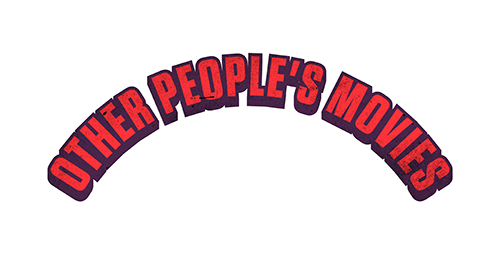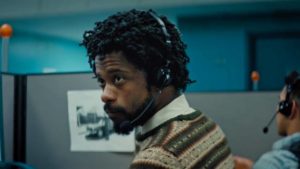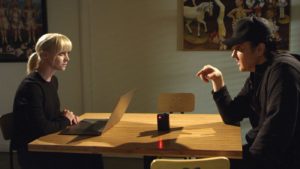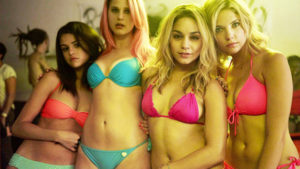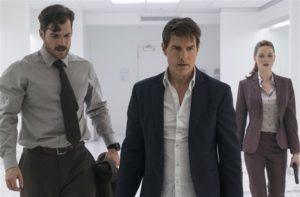
Mission Impossible: Fallout is part six of the action/thriller franchise based on the 1960’s television show that producers Tom Cruise and Paula Wagner first adapted way back in 1996. Since that film, there has been a succession of great directors involved who have passed the torch down to one another with each new entry.
Brian De Palma, John Woo, J.J. Abrams (who remained a producer on the series after directing the third installment), Brad Bird, and Christopher McQuarrie all kept topping one another with insanely dangerous stunts (most of which, you’ve likely heard, were performed by star Crusie), intricate action sequences, and storylines that were increasingly coherent and emotionally involving. In other words, the franchise, for the most part, just kept getting better. This is in spite of the fact that all the films have derived from the same basic structure and formula since the 1990’s.
For the first time, a director returns to the series with Fallout. It was written and directed by McQuarrie, who performed the same duties on the previous installment, Rogue Nation, to which this newest outing is a direct sequel. While that effort was a small drop in quality from the previous two films, it was apparently only a warm-up for the filmmaker. Fallout isn’t only the best of the Mission: Impossible films, it’s also one of the most ambitiously and intensely executed action movies ever made.
Ethan Hunt (Cruise) and his merry band of Impossible Mission Force members (Ving Rhames and Simon Pegg) are once again faced with the task of saving the world. The captured nemesis from Rogue Nation (played by Sean Harris with appropriate cerebral menace) is intertwined with the plutonium they’re currently trying to track down. Naturally, the IMF is forced to go undercover and help break him out of prison.
Henry Cavill (who wears the mustache that ruined Justice League quite well) is a new addition to the cast. He portrays a pesky and suspicious agent assigned by the powers that be (headed by an always-great Angela Bassett) to hover over Cruise’s shoulder, bully him, and annoy him endlessly throughout the film.
Got it? Good.
Now that that’s out of the way, let’s address what really matters about Fallout: those life-risking stunts that Tom Cruise performs so we keep paying to see his movies. In today’s age of digital effects and green screen replacement shots, it adds so much to a movie like Fallout knowing how much of it was performed in-camera. The film is bound by an integrity that is present simply because it feels real, and Fallout is subsequently more titillating than most current action films are ever allowed to be.
McQuarrie’s work in Fallout is expert, nearly putting him in rank with the likes of James Cameron or John McTiernan when it comes to designing onscreen action. In spite of all the death-defying stunt work involving window jumping or helicopters, the most impressive bit of action in the film takes place in a bathroom. Due to the simple ingenuity of McQuarrie’s staging, the confined quarters only add to the scene’s thrillingly visceral impact, proving he is a director who doesn’t need the crutch of excess to excel.
Cruise, with his ability to keep churning out quality entertainment after decades in Hollywood, further earns his reputation as one of the smartest and most determined actor/producers around. His performance is as intensely committed as ever in Fallout. He also manages to make Ethan Hunt more likable and human than he ever has before. McQuarrie’s script puts emphasis on Ethan’s care for the individual, and Cruise effortlessly sells it. His selectively earnest screen presence carries the film’s dramatic weight as effectively as his adrenaline-fueled physicality carries the action.
The only real fault to the film is its storyline. While some twists and turns take us to new(ish) places, Fallout is essentially a retread of ground that was already covered in the five previous films: the team is assigned to a mission, the mission gets compromised, Ethan and whoever is left of his team have to find out who crossed them, a mysterious woman who can kick ass in high heels aids/flirts with/possibly betrays Ethan, then Ethan has to dangle from something that’s dangerously high and/or fast so he can save the world at the last second.
Did we really need another one? Do we need anymore after this?
If the action is going to continue to be this hypnotizing, if the stunts are going to be this heart-wrenching, and if the last ninety minutes of each movie is going to have my palms sweating, my legs bouncing, and my back arched so I can sit on the very edge of my seat throughout all of it…? If I’m so involved that it doesn’t really matter how lame the story is…?
Then, yes. We did need Fallout and we do need at least one more Mission: Impossible entry. Though it might be wise for Cruise to leave the series on a high note and quit while he’s ahead- at least, before his ambition to top himself literally kills him.
GRADE: A-
